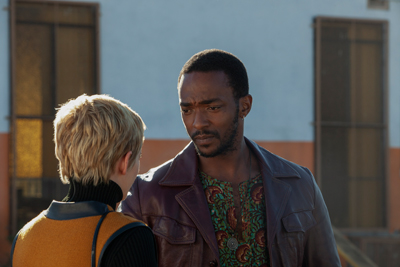Kristen Stewart Seberg

Written by Joe Shrapnel and Anna Waterhouse
Cast: Margaret Qualley, Kristen Stewart, Zazie Beetz
Director: Benedict Andrews
Genre: Biography, Drama, Thriller
Running Time: 96 minutes
Synopsis: In his second feature film, the renowned Australian theater director Benedict Andrews offers up a noir-ish thriller set amidst the late-1960s Hollywood that pulses with modern themes and political intrigue. It weaves together facts and historical incidents into a kind of speculative narrative based on real events in the life of actress Jean Seberg, when her involvement with the Black Power movement leaves her vulnerable to a smear campaign engineered by Hoover's FBI.
When Seberg opens, Jean (Stewart) is already a well-known actress and style icon, but stardom has failed to satisfy her restless, inquisitive side. A life-long supporter of the civil rights movement, Jean is immediately attracted to Hakim Jamal (Mackie), a charismatic activist in the Black Power movement, and their relationship quickly shifts from political to romantic. This entanglement, and Jean's financial support of various civil rights groups, makes her a target of COINTELPRO, a covert FBI surveillance operation aimed at disrupting political organizations.  Recent FBI recruit Jack Solomon (O'Connell), a gifted surveillance specialist with an expertise in sound, joins the L.A. field office and is teamed up with a more senior agent, Carl Kowalski (Vaughn). They wiretap Hakim's home and Jean's residences to document the couple's affair and expose her financial contributions to the movement. Jack becomes her shadow, maintaining round-the-clock surveillance, and is drawn in by Jean's luminous presence, ultimately testing his loyalty to his young wife (Qualley).
Recent FBI recruit Jack Solomon (O'Connell), a gifted surveillance specialist with an expertise in sound, joins the L.A. field office and is teamed up with a more senior agent, Carl Kowalski (Vaughn). They wiretap Hakim's home and Jean's residences to document the couple's affair and expose her financial contributions to the movement. Jack becomes her shadow, maintaining round-the-clock surveillance, and is drawn in by Jean's luminous presence, ultimately testing his loyalty to his young wife (Qualley).
Realizing that agents are following her, tapping her phones and opening her mail, Jean becomes increasingly unstable. When she gets pregnant while making a film in Mexico, the FBI seizes upon this as a chance to crush her and discredit the movement by seeding scandalous disinformation that rips through Jean's family and drives a wedge between her and her passions. Horrified by this outcome and shamed by his complicity, Jack embarks on a mission of salvation and redemption that brings him briefly into direct contact with Jean. For him, it's both a confrontation of his obsession and a moral turning point. For her, it's confirmation that she has been a victim of a corrupt system and a mirror into the part she has played in her own unraveling.
Seberg
Release Date: January 30th, 2020
Director's Statement
A camera traps you, the true you"not a distorted reflection in a mirror, but a pure critical reproduction in a magnifying lens.
" Jean Seberg
I first discovered Jean Seberg when my high-school French teacher screened Godard's Á Bout de Souffle for our class. I was blown away. She redefined what presence and truth meant onscreen. Only later would I learn the facts of her extraordinary, short life and how she was burnt by the FBI's secret war against civil rights in America. Like the character of St. Joan of Arc, whom she played in Otto Preminger's film, Jean passed through the fire. Surviving breakdown and loss, she transformed volatility into hard-won grace. Her story still feels urgent, full of resonance with our own complex times.
Now feels like exactly the right moment to tell the story of the FBI's illegal COINTELPRO operation against Jean, activist Hakim Jamal and the Black Power Movement. In this narrative, we encounter, in germinal form, the weaponization of state surveillance for political ends. Fifty years on, Jean's story directly reflects our current reality: the staggering racism of American politics; the challenge of separating truth from lies in an era of so-called fake news; and a culture of mass surveillance.
 I wasn't at all interested in making a conventional biopic about Jean's life, nor did I want to make a nostalgic paean to the 1960s. I wanted to get close to Jean and inside what happened to her between 1968 and 1971. SEBERG weaves together facts and actual FBI documents into a kind of speculative history that explores Jean's subjective experience. While her political engagement offers a glimpse into the civil rights struggle of late 60s America, Hakim's wife Dorothy points out that Jean is merely "a tourist" in that world. Her activism is complicated by notions of white privilege and by her extra-marital affairs with black activists. Her actual contributions were relatively modest"donations and fund-raising mostly"and made in private. Unlike some of her peers, Jean did not preach her beliefs and rarely grabbed headlines for her activism. But she was looking to make a difference, daring to leave the box defined by her industry and her culture and, for that, she was ruthlessly and unfairly punished. Jean was by no means the biggest victim of the FBI's COINTELPRO's campaign of systematic harassment and persecution, yet her fate stands as a kind of American tragedy, a luminous life destroyed by the machinery of state surveillance.
I wasn't at all interested in making a conventional biopic about Jean's life, nor did I want to make a nostalgic paean to the 1960s. I wanted to get close to Jean and inside what happened to her between 1968 and 1971. SEBERG weaves together facts and actual FBI documents into a kind of speculative history that explores Jean's subjective experience. While her political engagement offers a glimpse into the civil rights struggle of late 60s America, Hakim's wife Dorothy points out that Jean is merely "a tourist" in that world. Her activism is complicated by notions of white privilege and by her extra-marital affairs with black activists. Her actual contributions were relatively modest"donations and fund-raising mostly"and made in private. Unlike some of her peers, Jean did not preach her beliefs and rarely grabbed headlines for her activism. But she was looking to make a difference, daring to leave the box defined by her industry and her culture and, for that, she was ruthlessly and unfairly punished. Jean was by no means the biggest victim of the FBI's COINTELPRO's campaign of systematic harassment and persecution, yet her fate stands as a kind of American tragedy, a luminous life destroyed by the machinery of state surveillance.
Making Seberg, I was deeply conscious of the parallels between filmmaking and the mechanics of surveillance. The equipment"cameras, microphones, screens etc."is, of course, similar, as is the observation of the minutiae of life. Cinema, like surveillance, invites us into close proximity. We become voyeurs, peering into normally hidden spaces and examining all the private details, including sides of people they themselves can't always see. In Jean's case, this scrutiny is doubled since we are watching an actress, someone who already lives her life in public, under the gaze of the camera.
In my career as a director, I've been privileged to work with extraordinary actors. I've observed up close how they put their lives on display for audiences. Their job is to mine the raw material of the self to create truth onstage or onscreen. I'm fascinated by the courage and vulnerability it takes to exist on the fragile border between role and life. Jean's privacy, exposed to the public onscreen and ruthlessly violated by the FBI, is the battlefield of the film.
The foundational conceit of Joe Shrapnel and Anna Waterhouse's script is to follow Jean in parallel with fictional FBI agent Jack Solomon. The thrill and pulse of the filmmaking is the interlacing of their lives. Throughout the film, the two characters walk side by side"unaware of, yet sensing, one another. As their fates collide, Jack becomes our surrogate, watching Jean unravel up close. His journey challenges us to examine our own voyeurism, our own cinematic hunger to lay characters bare. He peers into Jean's private life and the line between monitoring, voyeurism and obsession blurs.
In Seberg, I aimed to combine the torque and epic scope of a conspiracy thriller with the raw intimacy of a love story. For the visual language of surveillance, I drew upon great films of the 1970s, including Coppola's masterpiece, The Conversation, and Alan Pakula's paranoia trilogy, Klute, Parallax View and All The President's Men. Those films emerged at a time, like ours, of political crisis and upheaval.
 I wanted to film Jean's story with a luxurious, romantic beauty that matched her charm and enchantment. This is evoked by Rachel Morrison's prowling camera, Jahmin Assa's elegant rooms, Michael Wilkinson's exquisite clothes and the jagged refinement of Pamela Martin's cutting. We resisted any period clichés, preferring to depict the various spaces that Jean and the FBI traverse with a luminous, haunted beauty. The special LA loneliness of Joan Didion's great 1970 novel, Play It As It Lays, was a touchstone, as was Gena Rowlands' raw portrayal of an actress melting down in Cassavetes' Opening Night. I did not want an actor who would simply impersonate Jean. I needed someone who would embody her and put themselves on the line. Kristen Stewart's Jean is the supernova at the center of the film, and caught in the eye of the storm. The parallels between Jean's life and Kristen's are startling. Both were thrust into the public eye at a young age and both managed to survive intense media attention. Each is a risk-taker, possesses a luminous otherness onscreen and has become a style icon. Like Jean, Kristen has given formidable performances in French cinema, defying critics back home. Most importantly, both are raw, instinctive actresses. Neither hides behind a mask"they're simply not capable of faking it. They ask us to come to them and meet them on their own terms.
I wanted to film Jean's story with a luxurious, romantic beauty that matched her charm and enchantment. This is evoked by Rachel Morrison's prowling camera, Jahmin Assa's elegant rooms, Michael Wilkinson's exquisite clothes and the jagged refinement of Pamela Martin's cutting. We resisted any period clichés, preferring to depict the various spaces that Jean and the FBI traverse with a luminous, haunted beauty. The special LA loneliness of Joan Didion's great 1970 novel, Play It As It Lays, was a touchstone, as was Gena Rowlands' raw portrayal of an actress melting down in Cassavetes' Opening Night. I did not want an actor who would simply impersonate Jean. I needed someone who would embody her and put themselves on the line. Kristen Stewart's Jean is the supernova at the center of the film, and caught in the eye of the storm. The parallels between Jean's life and Kristen's are startling. Both were thrust into the public eye at a young age and both managed to survive intense media attention. Each is a risk-taker, possesses a luminous otherness onscreen and has become a style icon. Like Jean, Kristen has given formidable performances in French cinema, defying critics back home. Most importantly, both are raw, instinctive actresses. Neither hides behind a mask"they're simply not capable of faking it. They ask us to come to them and meet them on their own terms.
Seberg is a love song to Jean..
" Benedict Andrews, Reykjavik, August 2019
Timeline
November 13, 1938 – Jean Dorothy Seberg is born in Marshalltown, Iowa.
1952 – Jean joins the Des Moines chapter of the NAACP.
1957 – Jean makes her film debut in the title role of Saint Joan, after being chosen in a talent search by director Otto Preminger. Her experience in making the film is miserable, due to abusive treatment by Preminger and to a burning-at-the-stake scene in which she is set on fire and accidentally burned. The film is an artistic and commercial flop. Variety says Jean's performance "rarely rises above the level of the Iowa prairie."
1958 – Jean also stars in Preminger's Bonjour Tristesse. She meets and marries her first husband, Francois Moreuil, and relocates to France.
1960 – Jean stars alongside Jean-Paul Belmondo in Jean-Luc Godard's À bout de souffle (Breathless), which becomes a massive hit and turns Jean into an international style icon.
 1962 – Jean marries French aviator, novelist and diplomat Romain Gary. They have a son together, Alexandre Diego Gary.
1962 – Jean marries French aviator, novelist and diplomat Romain Gary. They have a son together, Alexandre Diego Gary.
1965-1970 – Jean returns to Hollywood to make films: Moment to Moment, A Fine Madness, Pendulum, Paint Your Wagon. During this time, she provides financial support to various civil rights groups, including the NAACP and the Black Panther party. This triggers FBI surveillance under the covert COINTELPRO operation. 1969 – During the filming of Macho Callahan in Mexico, Seberg becomes pregnant by a young student revolutionary. The FBI seizes upon this information to spread a scandalous lie that the father is a black civil rights activist. The story is reported in The Los Angeles Times, Newsweek magazine and other publications.
1970 – Jean goes into premature labor, delivering a 4-pound baby girl who lives for just three days.
September 8, 1979 – After being missing for 9 days, Jean is found dead, her decomposing body wrapped in a blanket in the back seat of her car, parked near her Paris home. An empty bottle of barbiturates is by her side, along with a note written in French: "Forgive me. I can no longer live with my nerves."
Release Date: January 30th, 2020
MORE





